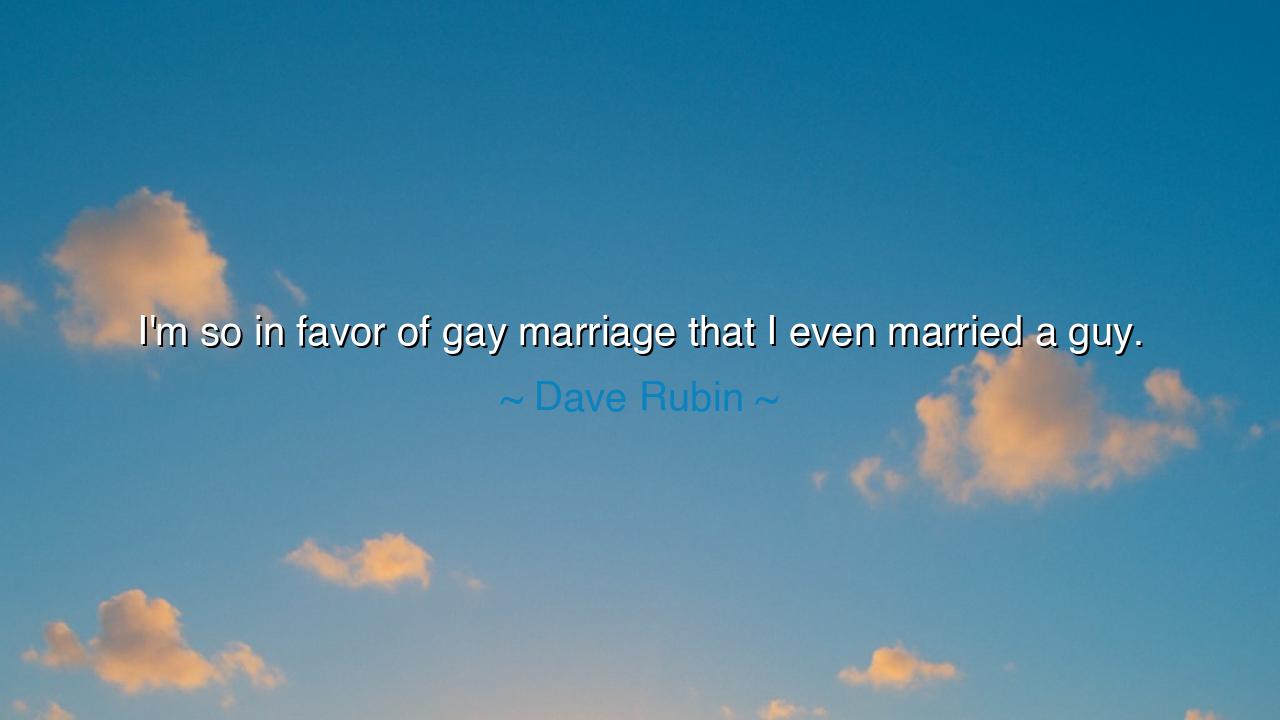
I'm so in favor of gay marriage that I even married a guy.






In the words of Dave Rubin, “I’m so in favor of gay marriage that I even married a guy.” With humor and clarity, Rubin declares a truth that is both personal and universal: that to advocate for equality is not merely to speak of it, but to live it. His words are light in tone, yet weighty in meaning, for they mark the triumph of love over centuries of silence, rejection, and denial. They remind us that marriage, once denied to so many, is no longer a privilege of the few, but a right that belongs to all.
The ancients would have seen in this statement the blending of jest and wisdom. Many sages, from Diogenes the Cynic to the poets of Rome, spoke truths through irony, making laughter a vessel of enlightenment. Rubin does the same. He frames his support for gay marriage not as an abstract political principle, but as the living reality of his own union. By doing so, he dissolves the barrier between philosophy and life, between belief and practice. His marriage becomes not only personal joy, but also testament to the progress of society.
History offers us the shadowed background against which these words shine. For centuries, love between men or between women was condemned, hidden, or punished. Laws forbade it, churches condemned it, and societies sought to erase it. Yet love endured, in secret letters, in whispered promises, in lives lived courageously against the tide. From the persecution of Oscar Wilde in Victorian England to the assassination of Harvey Milk in San Francisco, the struggle for recognition was long and bitter. To stand today and say openly, “I married a guy,” is to stand upon the sacrifices of those who came before, and to honor their courage with fulfillment.
Consider the tale of Mildred and Richard Loving, whose marriage in 1958—between a Black woman and a white man—was deemed illegal in their state of Virginia. Their case, Loving v. Virginia, rose to the Supreme Court, which struck down laws banning interracial marriage. Their love, once outlawed, became the foundation of a new era of equality. So too with gay marriage: what was once forbidden has become possible, and in the act of marrying, Rubin participates in a victory for all who believe in freedom of love.
The deeper meaning of Rubin’s words lies in the fusion of humor and defiance. By speaking lightly, he strips away the fear and hatred that once surrounded the idea of gay marriage. What was once scandal is now jest, what was once whispered is now proclaimed openly. This is the ultimate triumph: not only that the right to marry is legally protected, but that it can be spoken of casually, with joy and even with laughter. Equality is not only a law; it is a way of life that no longer trembles at condemnation.
The lesson for us is clear: equality must be lived, not merely argued. Rubin’s union is more powerful than a thousand debates, for it shows that when barriers are broken, love flourishes in ordinary and extraordinary ways. To live openly is to change the world, for each act of authenticity weakens the chains of prejudice. In this, his words are a call to all who believe in justice: do not only speak of it—embody it.
Practical actions follow from this wisdom. Support the rights of others to love and marry as they choose, for in defending their freedom you defend your own. Speak openly of equality, but also live it, letting your choices be testimony to your values. Honor those who came before, whose struggles paved the way, and continue the work for those whose freedoms are still denied. And above all, let love be your compass, for where love is honored, equality takes root, and society becomes whole.
Thus, Dave Rubin’s words, playful and profound, remind us that the greatest victories of humanity are not always shouted in battle, but sometimes spoken in laughter at the dinner table, in vows at the altar, in lives lived without apology. Let us pass down this truth: that the triumph of gay marriage is not merely in the changing of laws, but in the freedom to speak of love as lightly, as joyfully, and as universally as anyone else.






AAdministratorAdministrator
Welcome, honored guests. Please leave a comment, we will respond soon